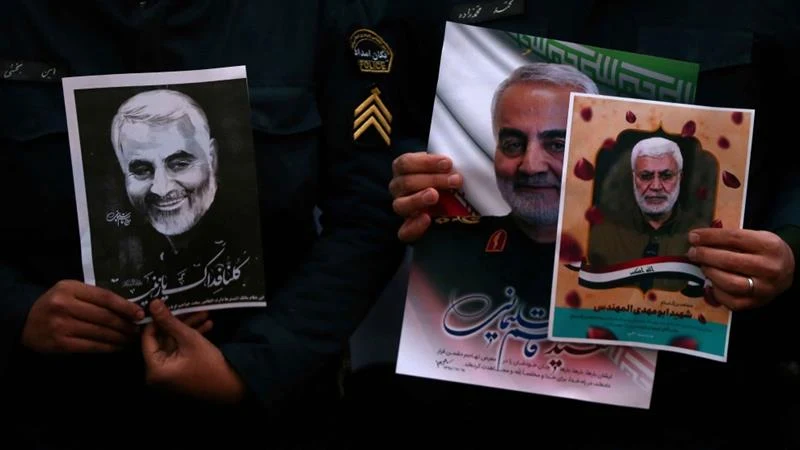Iranian guards hold a picture of Iranian General Qassem Soleimani, during a protest against his killing, in front of the UN office in Tehr...
 |
| Iranian guards hold a picture of Iranian General Qassem Soleimani, during a protest against his killing, in front of the UN office in Tehran, on January 3, 2020 [WANA/Nazanin Tabatabaee via Reuters] |
US attempts to portray Soleimani as a master terrorist leader, like say, the Islamic State of Iraq and the Levants's (ISIL, or ISIS) Abu Bakr al-Baghdadi is wrong and misses the big picture. Soleimani may have been controversial, even a bloody "shadow commander", but he served at the pleasure of Iran's supreme leader, Ali Hosseini Khamenei, to protect and expand the regime's interests in the Middle East. The killing of Soleimani is an attack on the Iranian state. So why did the US resort to his assassination, why now and what is its endgame?
The Trump calculus
Several people in Trump's close circle like former national security advisors, Michael Flynn and John Bolton, and "unofficial advisors" like Israel's Benjamin Netanyahu and Saudi Crown Prince Mohammed Bin Salman, have all incessantly urged him to act militarily against Iran and push for regime change. But for three years, Trump chose to ignore their advice, insisting that the US does not seek war with the Islamic republic. Instead, he slapped Tehran with tough sanctions aimed at crippling its economy, containing its regional ambitions and forcing it back to the negotiations table to sign another deal - a "Trump deal".
So, what changed? Well, basically, the Trump administration realised its "maximum pressure" policy has failed. It may have hurt Iran but it did not isolate or deter a bellicose Iranian leadership. Iran's proxy attack on the US embassy in Baghdad earlier this week was a rude reminder of the humiliating 1979 takeover of the US embassy in Tehran that demoralized the Carter administration and the 2012 attack on the US diplomatic compound in Benghazi that bruised the Obama administration.
The Trump administration, which feared a repeat of this scenario in Baghdad, claims its response was meant to safeguard American lives from future attacks, not start war with Iran. Or, according to the sceptics, it was meant to safeguard the Trump presidency by deflecting attention from the impeachment during an election year. Either way, the assassination is a clear departure from the policy of sanctions, showing Trump's readiness to use US military might as much as its economic power. Actions speak louder than words.
Iran's strategy From the outset, the Islamic republic rejected Trump's abandonment of the nuclear deal and the imposition of sanctions as unacceptable bullying, and refused to sit by idly while US sanctions blocked the country's vital oil exports, crippled its economy and bankrupted its military. Tehran expanded its proxy attacks on US assets and allies in the area, including recent attacks on tankers in the Gulf and Saudi oil installations, leading up to this week's attack on US positions in Iraq. Tehran has also cultivated new strategic alliances with Russia and China, joining the two for war games in the Gulf of Oman in late December.
The assassination is not going to change any of these policies; in fact, it will merely accelerate them. If history is any guide, Iran will absorb the attack at first and avoid an all-out war with far superior US military forces. Trump may have challenged Khamenei for a duel, but the supreme leader prefers fighting in the shadows. So, respond, he will. His options are plentiful and his timetable is open-ended. This includes assassinations, covert operations, low-intensity warfare and oil and maritime disruptions in the Gulf region. In other words, more of the same - much more. This will especially be the case in Iraq, where Iran has long exploited US failure and retrenchment in order to shore up its allies and clients and increase its strategic leverage against the US. And it may well do that again.
Vying for Iraq
Contrary to conventional wisdom and apocalyptical scenarios of World War III starting, the assassination of Soleimani may well prove to be Trump's ticket out of Iraq, just as the assassination of Abu Bakr Al-Baghdadi was his ticket out of the Syrian conflict. This fits in perfectly with his desire for strategic redeployment in the Middle East to extract US troops and civilians from the local hotspots and provide the Pentagon with greater freedom to act against its enemies.
This means more drone attacks, special forces operations and guided missile strikes with minimum risk for US personnel. It is nothing new for the US, which redeployed out of Lebanon following the 1983 bombing of the US Marine barracks, and pulled out of Somalia after the 1993 attack on US troops. Similarly, it is planning a withdrawal from Afghanistan. Of course, Iraq is different. It is a far bigger deal for the US after it invested billions of dollars and lost thousands of lives trying to keep hold of the country over the past 16 years. But as a businessman come statesman, Donald Trump is guided by a golden business rule that says: do not throw good money after bad, regardless of pride, oil or partners.
The question is: will Iran exploit this US tendency for retrenchment, or encourage its propensity for war? Either way, Iraq and the rest of the divided Arab world will continue to suffer as a result, in accordance with the old Swahili proverb: when elephants fight and when they play, it is the grass that gets crushed.






